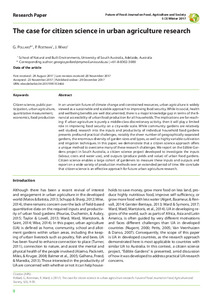| dc.date.accessioned | 2018-01-04T12:50:43Z | |
| dc.date.available | 2018-01-04T12:50:43Z | |
| dc.date.issued | 2017-12-29 | |
| dc.identifier.issn | 2197-411X | |
| dc.identifier.uri | urn:nbn:de:hebis:34-2017091153466 | |
| dc.identifier.uri | http://hdl.handle.net/123456789/2017091153466 | |
| dc.language.iso | eng | |
| dc.publisher | Department of Organic Food Quality and Food Culture at the University of Kassel, Germany and Federation of German Scientists (VDW) | eng |
| dc.rights | Urheberrechtlich geschützt | |
| dc.rights.uri | https://rightsstatements.org/page/InC/1.0/ | |
| dc.subject | citizen science | eng |
| dc.subject | public participation | eng |
| dc.subject | urban agriculture | eng |
| dc.subject | quantitative measurement | eng |
| dc.subject | economics | eng |
| dc.subject | food production | eng |
| dc.subject.ddc | 630 | |
| dc.title | The case for citizen science in urban agriculture research | eng |
| dc.type | Aufsatz | |
| dcterms.abstract | In an uncertain future of climate change and constrained resources, urban agriculture is widely viewed as a sustainable and scalable approach to improving food security. While its social, health and wellbeing benefits are well documented, there is a major knowledge gap in terms of the financial accessibility of urban food production for all households. The implications are far-reaching: if urban agriculture is purely a middle-class discretionary activity, then it will play a limited role in improving food security on a city-wide scale. While community gardens are relatively well studied, research into the inputs and productivity of individual household food gardens presents profound practical challenges, notably the sheer number of geographically separated gardens, the enormous diversity of garden sizes and types, as well as highly variable cultivation and irrigation techniques. In this paper, we demonstrate that a citizen science approach offers a unique method to overcome many of these research challenges. We report on the Edible Gardens project in South Australia, a citizen science project developed to investigate the inputs (labour, costs and water use), and outputs (produce yields and value) of urban food gardens. Citizen science enables a large cohort of gardeners to measure these inputs and outputs and report on a wide variety of production methods over an extended period of time. We conclude that citizen science is an effective approach for future urban agriculture research. | eng |
| dcterms.accessRights | open access | |
| dcterms.bibliographicCitation | In: Future of Food: Journal on Food, Agriculture and Society. Witzenhausen : University of Kassel, Department of Organic Food Quality and Food Culture. - Vol. 5, No. 3 (2017), S. 9-20 | |
| dcterms.creator | Pollard, Georgia | |
| dcterms.creator | Roetman, Philip | |
| dcterms.creator | Ward, James | |

